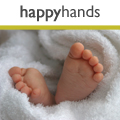Baby Clinic
Development
Talking
From birth there is a strong sense of communication between your baby and you, and then a growing number of familiar faces.
Early forms of direct communication will be crying, cuddling, smiles and looks that acknowledge conversations directed reassuringly towards her. But soon she will find the beginnings of her own voice.
First attempts at talking
By about six or seven months your baby will start to enjoy playing with sounds. Some of the humming noises might be her way of dealing with the pain of teething, but single-syllable noises such as ‘der, der, der’ or ‘bah, bah’ will be her early attempts to make contact through speech.
Encourage ‘talking’
Don’t talk to your baby like she is a parrot! Instead be encouraging, smile and help her associate good communication with a range of two-way acts that include touch, facial expression and sounds. You can make similar sounds back, but don’t always retreat to babytalk around your child. Even reading the front page of the Financial Times can be enjoyable for her if you recount it in soothing, playful tones.
And even when you are busy with chores like cooking or paying bills, or you are taking her out for, offer narration on what you’re doing and where you are going rather than leaving her to wonder what you’re up to.
Baby signing – a simple form of sign language that can be used for all babies not just those with impaired hearing – can be a great way to encourage good communication and understanding long before proper words emerge. And despite what you might expect, signing can really help with early talking in children who have become confident communicators.
Also bear in mind that your baby will understand your quite well long before she can talk, so acknowledge this understanding and celebrate it as it develops.
Speech development
A couple of months after the first one-syllable sounds, you might notice your baby can start to put a string of short sounds together. If she likes the feel of these sounds in her mouth and the way their come out or the way they get a reaction from you, she may well want to keep saying them again and again.
The first proper words are unlikely to start to form until your child is at least 14 months, possibly older, and sentences are unlikely to arrive much before her second birthday, but your interest in what she has to ‘say’ now can have a big impact on how those real words finally tumble out.
Related Articles
A Great Day Out at The Baby Show, Excel
Preparing Premature Infants for School
BornFree – the natural approach to bottles
Bottle-feeding: keeping it natural
BabyBjörn venture into drinking cups
Buyer's guide to nappy rash treatments
ReadingZone: best new books published in October
Related Products
Image Casting, Baby Foot and Hand Casts
Proactive, Proactiv Introductory Core Kit
Related Forum Topics
Forums: Baby
Re: Second hand/ nearly new baby shops??
Clare, Mother of 2, London
Re: My daugher's got croup - 8mths
Amelie, Mother of 1
Re: Cranial massage
Clare, Mother of 2, London
Have Your Say
Be the first person to comment on this article, just post a comment below.






In order to post a comment you need to be a member. Join Now | Sign in